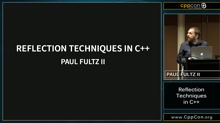CppCon 2016: David Schwartz Keynote and Jason Turner Plenary

Also, Jason Turner will give a plenary talk about using C++17 to write high-performance code on the Commodore 64.
You can read more about their talks here.
There’s still time to register for CppCon 2016! Come join us in September!

 ACCU’s Overload journal of August 2016 is out. It contains the following C++ related articles.
ACCU’s Overload journal of August 2016 is out. It contains the following C++ related articles. Have you registered for CppCon 2016 in September? Don’t delay –
Have you registered for CppCon 2016 in September? Don’t delay –  Have you registered for CppCon 2016 in September? Don’t delay –
Have you registered for CppCon 2016 in September? Don’t delay –